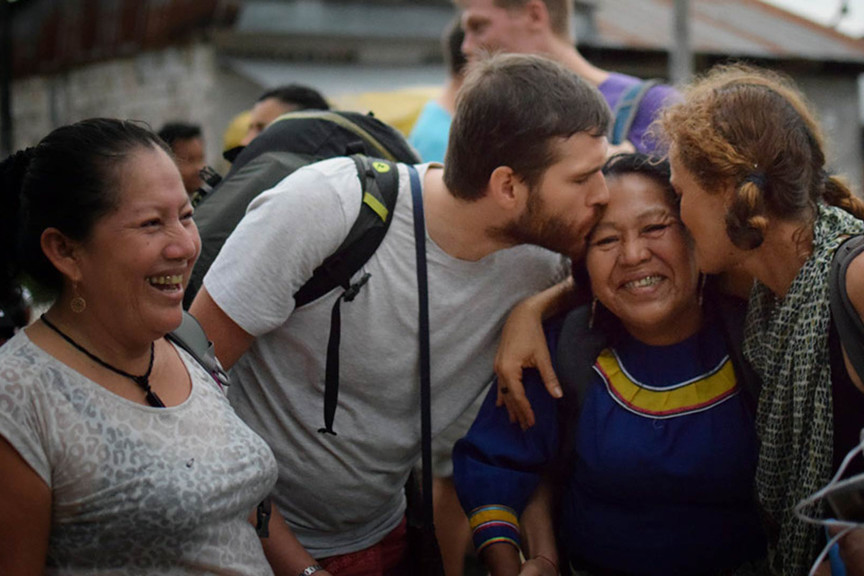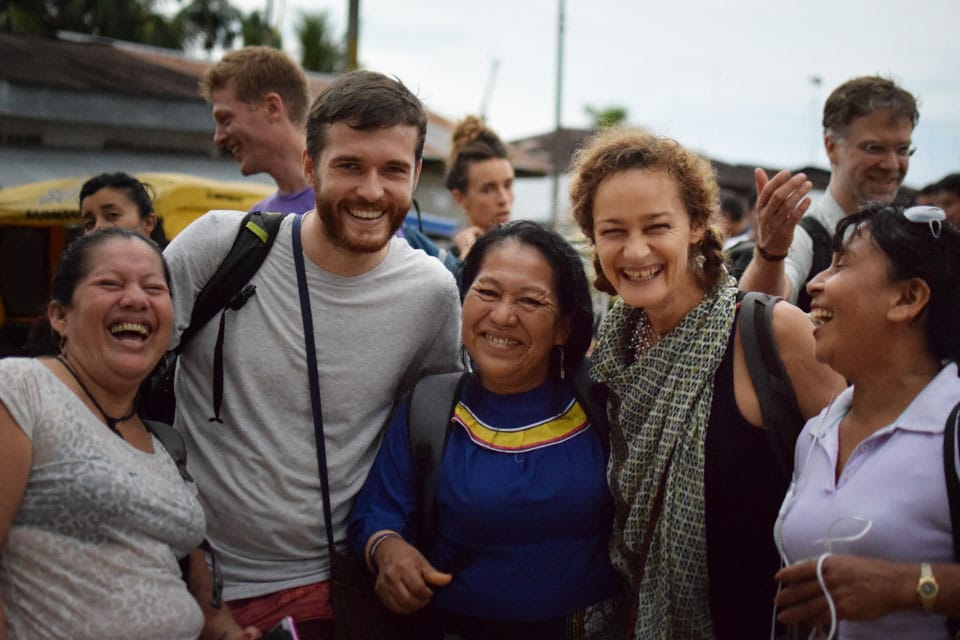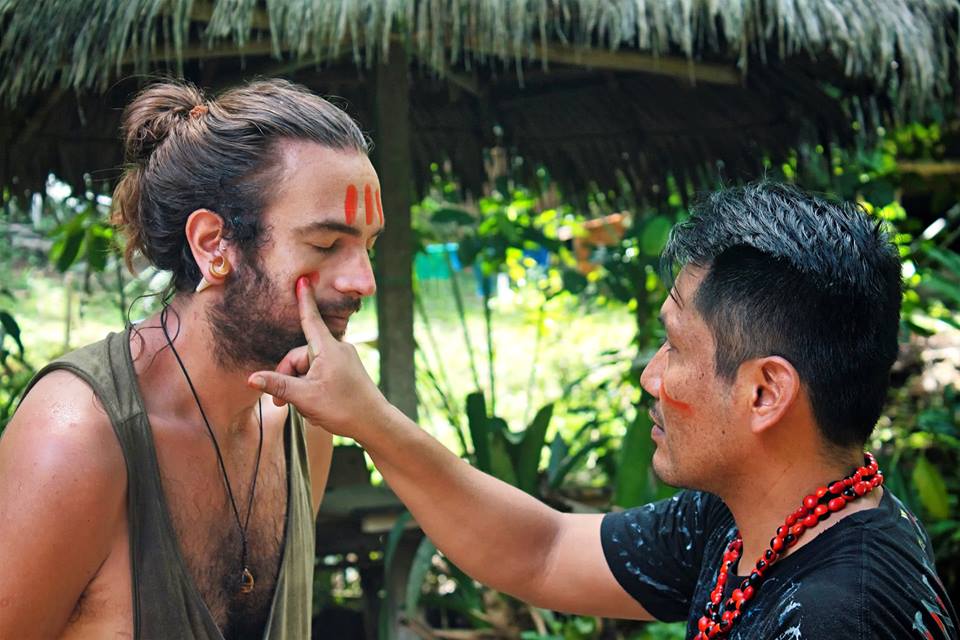Globalhuasca: Reciprocity and Integration of Indigenous and Scientific Worldviews
Even if we don’t necessarily share religious, spiritual, or mythological assumptions, are we able to reconcile between such seemingly different and antagonistic worldviews?

Psymposia is a 501(c)(3) nonprofit research and media organization that offers critical perspectives on drugs, politics, and culture. We rely on contributions from our readers and listeners. Your support is vital to sustaining Psymposia.
Support Psymposia’s independent journalism on Patreon and help us drive the Mystery Machine! We’re a bunch of meddling kids who are unmasking the latest shenanigans on the psychedelics beat.
Jordan May sheds light on the undeniable impact that the globalization of ayahuasca has on the communities and ecosystems of the Amazon in Globalhuasca: A Closer Look at the Global Ayahuasca Movement. As he points out, the commodification, commercialization, and globalization of ayahuasca are no longer philosophical issues to be pondered, but rather lived and felt realities that need to be pragmatically addressed.
To that end, this piece focuses on two different but correlated problems:
-
- The possibility of working with ayahuasca and other forms of traditional plant medicine in a reciprocal way that steers away from colonial patterns of exploitation, resource extraction, and/or cultural appropriation
- The fundamental asymmetry found between the various enchanted indigenous worldviews and the theoretical/ideological limitations of materialistic Western science
Concerns about the commodification and globalization of ayahuasca were some of the most pressing messages articulated at the second World Ayahuasca Conference, organized by the International Center for Ethnobotanical Education Research & Service (ICEERS) in the state of Acre, Brazil. Albeit using different words and tones, sometimes in different languages, most of the indigenous representatives at the conference in Rio Branco—as well as some academic and independent Western researchers—shared similar sentiments of anger, resignation, and ambivalence regarding the mainstreaming of their traditions into the popular Western mind.
However, and perhaps more importantly, they also expressed a hopeful desire to cooperate in the creation of a meaningful intercultural dialogue. Indigenous leaders were very much aligned with the view that medicine is to be shared and should be readily available for anyone with an honest wish to do the hard work needed for deep individual and collective healing—independent of ethnicity, nationality, or socioeconomic status, as long as it is done with respect for their traditions.
Respect is not only about acknowledging the importance of dietary and sexual restrictions, the ceremonial designs, ritual, song, or reciprocal relationships that provide a safe container for ayahuasca experiences. It also means being aware of scientific hubris, of acknowledging that it’s indigenous practitioners—not any of us scientists or researchers—who are the true “experts” of their own traditions.
No depth of ethnographic work or pharmacological analysis can compare to the expertise derived from being the heirs to ancient oral traditions, lived and embodied cosmologies passed down through lineages of medicine men and women, whose memory of interdependence and interspecies communication hasn’t succumbed to the crushing weight of our disenchanted mechanistic worldview.
Respect means acknowledging a metaphysical substrate, which still allows people to have their own connection with the transcendental, a validation of animism not as a primitive, inferior theology, but as the lived reality of people whose whole lives are spent embedded within layers and layers of sentient and intelligent plants, fungi, animals, and spirits.
Even if we don’t necessarily share religious, spiritual, or mythological assumptions, are we able to reconcile between such seemingly different and antagonistic worldviews?
Can the scientific method ever align itself with the wishes of indigenous people to respect their cosmologies and practices, even when they sometimes fundamentally clash with a rational, materialistic, evidence-based science?
Can we transcend the deeply ingrained industrialist mythology that reduces the earth to a source of material resources to be grabbed, and benefit from ayahuasca without subverting the local environments, economies and cultures?
Scarcity and reciprocity
One of the main points stressed by indigenous leaders is that ayahuasca is one out of thousands of other botanical resources found in rich and diverse medical systems. Its ritual use is embedded within an enchanted worldview that ascribes agency and intelligence to the vegetal realm. Plants are not necessarily seen as sprouting pharmacies to be exploited by humans, but as conscious spirit-imbued sentient beings, masters of alchemy, with whom we can respectfully communicate.
As Westerners, heirs to our own materialistic, anthropocentric mythologies, it may make more sense for some of us to work in a reductive, molecule-based level. It is important, however, to be aware of the unanimous plight of the indigenous leaders, to respect their traditions, and at least make an effort to understand their worldview. From some perspectives, pharmahuascas or analogues of any kind will never be considered a proper “ayahuasca practice,” as using different plants would result in encounters with different spirits.
There is another way to address the problems of ayahuasca extraction and scarcity, one that is being explored by The Chaikuni Institute, a local, nonprofit organization partnered with one of the most successful retreat centers in the Peruvian amazon, the Temple of the Way of Light. This organization is currently experimenting with the cultivation of the slow-growing vine, with over 1,000 plants growing in their rainforest land. This initiative is one aspect of Chaikuni’s mission to implement equitable, inclusive, and abundant living systems inspired by both Western permaculture principles and indigenous philosophies based on reciprocity and interdependence.

Reciprocity is critical to consider at every level of engagement with ayahuasca, from the ceremonial space to the wider circles of social and environmental justice. There is a fundamental difference between the highly individualistic Western medical systems and the more collective-geared indigenous worldviews. From the perspective of Sumaq Kausai, nobody can be truly healthy unless we are all healthy. Nobody can really heal unless the rivers and forests are healed, too. Our individual traumas are inseparable from our social, cultural, and environmental traumas.
In order to address this particular problem, Chaikuni not only provides legal advice and other empowering services to the communities fighting on the front lines of ecological devastation brought about by oil companies, but has also put its dedicated team of forestal engineers, permaculture workers, and gardeners at the disposition of the surrounding communities in order to participate in communal projects and co-create sustainable income opportunities for local farmers, many of whom work for the Temple. Furthermore, both local workers and Amazonian indigenous students from the city of Iquitos are invited to attend ayahuasca ceremonies at the Temple for free.
Many of these students hail from ashuar, kichwa, awajún, and nine other Amazonian communities. Most of them have never drank ayahuasca before. In fact, many of them fear or outright dismiss it, buying into centuries of religious demonization and cultural devaluation of their own traditions. Besides including them in the activities of the center, it is an exciting opportunity to re-introduce this medicine to younger generations of indigenous communities who (as May writes in his article citing Langdon) tend to “increasingly adapt modern Western paradigms in order to avoid discrimination,” causing a sharp decline in the number of practitioners of traditional medicines. It will be interesting to see how this process unfolds over time, both in terms of the building up of their identities and their changing perceptions on medicine use.
Without a shadow of a doubt, there is always room for further healing the deeply patronizing and imperialist roots of Western presence in the Amazon. Yet there is something about the recent ayahuasca boom, and the kind of people that it brings to the jungle, that feels radically different to previous enterprises.
This new wave of foreigners settling down in the jungle are not necessarily the power-hungry and greed-driven entrepreneurs of the past—at least not all of them—but people who, having worked with medicine, and having incorporated the principles of interdependence and reciprocity into their worldviews, are genuinely and honestly interested in building sustainable and horizontal relationships with the locals, giving back to the communities that sustain their centers.

Beyond our romantic fantasies: On the proper translation and integration of traditional knowledge for the Western mind
The Westernization of indigenous communities has been a historical fact for a long time, and the pervasive stigma attached to native practices is a palpable reality. There’s a long legacy of rampant bio-piracy and appropriation of indigenous tools and wisdom by misguided new-agers and perhaps well-meaning but self-deluded neo-shamans with a shallow understanding of the real depth and complexity of these worldviews. The jungles of the world, both vegetal and urban, seem to be filled with itinerant medicine providers that may not be there holding space the day after—or the week after—when latent, overpowering processes finally unleash.
All of these aspects are not only detrimental to the integrity and continuity of indigenous traditions, but also greatly impact the painstaking processes through which these medicines are slowly gaining legitimacy and respect in the Western medical and drug-policy arenas.
In a way, these are all inevitable byproducts of a culture that is coming to terms with its own institutionalized madness, that is under the spell of a potential panacea for the affliction troubling Western minds.
But ayahuasca is far from being a magic bullet.
It holds great potential for healing, but also for dire trouble. Amazonian “shamanism”—particularly in Peru—as pointed out by one of the presenters at the conference, Evgenia Fotiou, is far from being a benevolent edifice solely at the service of healing.
Sorcery, witchery, “brujeria”—these are also the lived realities of ayahuasca practices, and black magic is at least as prevalent as healing within the context of its modern use. If we acknowledge its therapeutic power, we are forced to acknowledge also its potential dark sides, whether by malpractice, irresponsible use, or directed malevolence.
Irresponsible providers are, sadly, prevalent in both indigenous and Western settings. Whether different worldviews can be reconciled or not, our cultural programming is so different and insidious that despite our best intentions to adhere to traditional practices as closely as possible, it usually proves essential to translate particular aspects of ceremony and ritual to be optimally digestible for the Western mind. Many people in the West have started to use ayahuasca in settings that are far detached from its original contexts, such as university labs or in psychotherapeutic settings. I feel that this encounter between two different modalities of science is not necessarily antagonistic, but rather has the potential to be complimentary, provided that both sides keep an open, flexible, and curious mind.
Furthermore, other researchers and facilitators, such as Tanya Maté, coordinator of integration at the Temple of the Way of Light, or Marc Aixala, coordinator of the harm-reduction service at ICEERS, point out the potential dangers of engaging with this medicine without adequate preliminary psychological and emotional preparation, followed by a conscientious and responsible integration process. It is essential to understand that work does not end when the ceremony closes. In many instances, it is only the beginning.
For people living in tribal or communal societies, the end of a ceremony simply signals their return to communal life. For most of us living in highly industrialized and individualistic urban environments, the end of the ceremony usually signals a return to our exhausting and often alienating routine. How can we properly bring down our ethereal insights into practical use when we are immediately thrown from the comfort of the ceremonial space back into the chaos of city life, accompanied by familiar and perhaps maladaptive behavioral and relational patterns?
It is essential to set aside time and energy dedicated to the proper digestion and assimilation of the experience. Otherwise, we may run the risk of having our beautiful insights and deep realizations evaporate amidst the hustle and bustle of traffic jams, bank queues, or family dinners. Reciprocity and mutual care, pillars of survival and balance in traditional communities, have all but disappeared in Western cultures, where most relationships have been commodified to some extent.
Can the heavy presence of Westerners in the Amazon avoid the reproduction and perpetuation of neoliberal economic patterns that rely on the extraction of resources and the exploitation of marginalized populations? Can rational, evidence-based, and materialistic science cross-pollinate with the world of plant intelligence and spirits?
Personally, I am hopeful that the healing power of the medicines, coupled with the honest intentions of a few people who are really striving to make things right, will take us a step further towards our stated goals of mutual respect, reciprocity, and the opportunity for deep healing to each and every one of us who may seek it.
Luisa Elvira Belaunde, a Brazilian anthropologist who presented at the conference in Acre, reminds us that “The Jivaro people of northern Peru, when they speak their own language, will say ‘my heart thinks’ as opposed to ‘my brain thinks.’ They say that thoughts that come from the brain make their way straight through their body, immediately going out from the anus. Thinking from your heart, however, connects your thoughts with your blood and therefore your whole body, engaging all the force latent in a heartfelt thought.”
This could be the key to these conundrums: The cold, calculating lens through which the hyper-rational Western mind mistakes vibrant living forests for resources to be extracted, that naturalizes poverty as an opportunity to make profit, and devalues ritual and magic as primitive superstition, has a lot to learn from cultures that still “think” with a beating heart.
And vice versa: It isn’t about demonizing or rejecting scientific knowledge or Western interest. We must all look forward. A true dialogue must encompass the best of both worlds, which, in reality, is only one. One world that we must all learn to heal and sustain just as much as it sustains and heals all of us.
Note: The author acknowledges an unjust conflation between the scientific method and scientific materialism, the former being a technique that transcends metaphysical assumptions.
Hey! Before you go… Psymposia is a 501(c)(3) non-profit media organization that offers critical perspectives on drugs, politics, and culture. We strive to ask challenging questions, and we’re committed to independent reporting, critical analysis, and holding those who wield power accountable.
Our perspectives are informed by critical analysis of the systemic crises of capitalism that have directly contributed to the unmitigated growth of addiction, depression, suicide, and the unraveling of our social relations. The same economic elite and powerful corporate interests who have profited from causing these problems are now proposing “solutions”—solutions which both line their pockets and mask the necessity of structural change.
In order for us to keep unpacking these issues and informing our audience, we need your continuing support. You can sustain Psymposia by becoming a supporter for as little as $2 a month.
Adam Andros Aronovich
Adam is a PhD candidate living in the Peruvian Amazon, working as research coordinator and workshop facilitator for the Temple of the Way of Light. In addition, he is an active member of the Medical Anthropology Research Center in Catalunya, Spain, and a member of the Ayahuasca Community Committee at Chacruna.net. He has written for various publications around the world.





